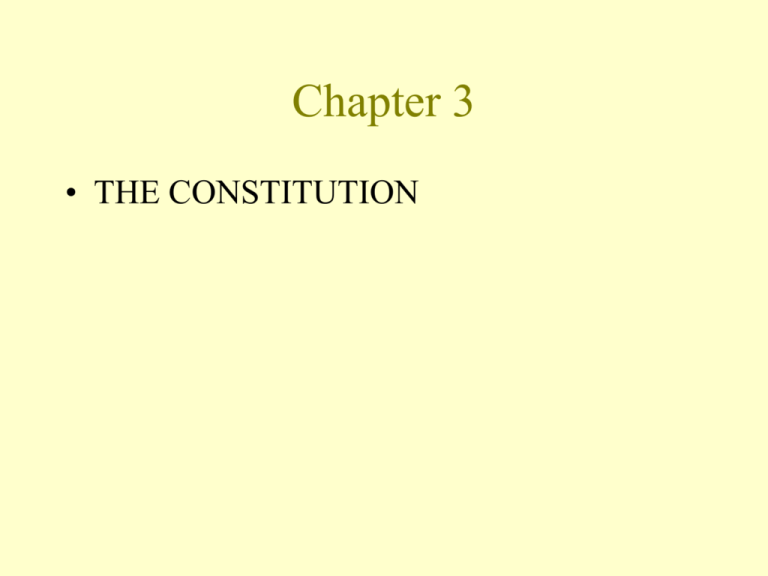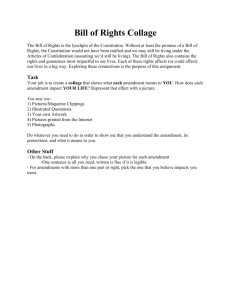
Chapter 3
• THE CONSTITUTION
Terminology
• Judicial Review – the power of a court to
decide if a law is constitutional or not
Terminology
• Popular Sovereignty – the idea that the
people are the source of any and all power
Terminology
• Limited Government – in both size and
scope, the idea that government is only as
large as the people decide it should be to do
its job. Constitutionality – holding the
definition of government to just what the
constitution says it should be.
Terminology
• Separation of Powers – the dividing of
government power in order to avoid a
harmful concentration of power
Terminology
• Checks and Balances – the idea that no one
of the three branches of government can
become and remain more powerful than the
other branches
Preamble
• We the People of the United States, in
Order to form a more perfect Union,
establish Justice, insure domestic
Tranquility, provide for the common
defense, promote the general Welfare, and
secure the Blessings of Liberty to ourselves
and our Posterity, do ordain and establish
this Constitution for the United States of
America.
7 Articles of the Constitution
• Article 1 – establishes the Legislative
branch – bicameral legislature and sets forth
details of Congress, how bills are passed
into law, and powers of Congress
7 Articles of the Constitution
• Article 2 – establishes the Executive branch
describes powers of the President, Vice
President and removal (impeachment)
7 Articles of the Constitution
• Article 3 – establishes the Judicial branch
describes Supreme Court, details thereof,
and defines treason (only crime defined in
the Constitution – it takes a confession or
two witnesses) Charging people with
treason is the, “favorite weapon of tyrants.”
7 Articles of the Constitution
• Article 4 – describes the creation and
powers of states, “full faith and credit,”
“pass through,” extradition, protection of
states by national govt.
7 Articles of the Constitution
• Article 5 – describes the formal amendment
process
7 Articles of the Constitution
• Article 6 – describes the supremacy of the
US over the states, payment of leftover
debts, and swearing in by oath of federal
officers
7 Articles of the Constitution
• Article 7 – describes the ratification process
of this constitution – nine of 13 states had to
ratify in order for it to be legal, they all
eventually did
1st Amendment
- Articulates freedoms of religion, speech, press,
assembly and petition.
- Called the five basic liberties although none are
guaranteed in absolute terms. (see Supreme Court
cases)
2nd Amendment
- Right to bear arms
- Applied to states maintaining militias for their own
protection, but this is balanced by state and federal laws
regulating the possession of guns by private citizens.
3rd Amendment
- Quartering of soldiers
- Of virtually no importance today, refers to the British
practice forced upon colonists under the Quartering Act of
the Intolerable Acts.
4th Amendment
- Search and Seizure
-The police must, in most cases, have a search warrant
obtained by demonstrating probable cause to a judge.
- If seized illegally, the evidence cannot be used against you in
court. (exclusionary rule)
5th Amendment
- Criminal Proceedings and Due Process
- A person cannot stand trial for a serious federal crime
unless first having been indicted (charged with that crime) by
a grand jury.
- One cannot be tried twice for the same crime (double
jeopardy)
-Protection against self incrimination in court (“I plead the
5th!”)
- Government may take private property for a legitimate
public purpose (eminent domain) but must pay a fair price.
6th Amendment
- Right to trial by jury
- Outlines your rights in criminal trials
- Greater discussion in subsequent chapters
7th Amendment
- Civil Trial Definitions and Procedures
- Only applies to civil trials (ones involving disputes between
private parties or government - not criminal matters) in federal
court
8th Amendment
- Freedom from Cruel and Unusual Punishment
- The punishment must fit the crime (reasonable)
- No excessive bail or fines
- Creates great debate over fairness of jails, prisons, and
capital punishment
9th Amendment
- Other Rights Reserved to the People
- Unenumerated rights - just because the right does not
expressly appear in the Constitution, does not mean you
don’t have it.
10th Amendment
- Powers Reserved to the States
- All the powers that the Constitution does not grant to the
national government, and at the same time does not forbid
to the states, belong to the states.
- The “Federalism Amendment”
11th Amendment
- Suits Against the States
- a state may not be sued in federal court by a resident of
another state, foreign country or even one of its own residents.
(sovereign immunity)
12th Amendment
- Election of President and Vice President
- describes the workings of the Electoral College, and how
those electors vote
13th Amendment
- Abolition of Slavery
- ratified in 1865, prohibits slavery and other forms of forced
labor, except punitive forms and compulsory armed forces
membership (the Draft)
14th Amendment
- Citizenship Rights
- defines citizenship
- no state shall deprive any person of life, liberty or property,
without due process of law. ( laws to do so must be fair and
apply to everyone the same way)
- contains the “Equal Protection Clause” used to extend
federal protection down to citizens at the state level.
15th Amendment
- Right to Vote by Race
- the right to vote cannot be denied based on race
16th Amendment
- Creation of Income Tax
-Gives Congress the power to levy an income tax on citizens
17th Amendment
- Popular Election of U.S. Senators
- Senators are now elected by the voters in each state and
not chosen by state legislatures (original Constitutional
method)
18th Amendment
- National Prohibition
- ratified in 1919, (progressive era) repealed entirely by the
21st Amendment in 1933, outlawed the making, selling,
transporting, importing or exporting of alcoholic beverages in
the U.S. Many families promptly got rich “running demon
rum” ie the Kennedys
- Led to the development of huge organized criminal
elements ie Al Capone in Chicago.
19th Amendment
- Voting Rights for Women
- ratified in 1920, No person can be denied the right to vote
based upon gender.
- Suffrage - the right to vote
- Suffragettes - radical ladies of their time
20th Amendment
- Lame Duck Amendment
- shortened the period of time a member of Congress who
was defeated for reelection remained in office. (from
December following an election to Jan. 3)
- Moved the swearing in of Pres. And V.P. back to Jan. 20
instead of March 4.
21st Amendment
- Repeal of prohibition
- ratified 1933, gave states the power to control what they
were denied under the 18th Amendment
22nd Amendment
- Two Term Limit for President (1951)
- No President may serve more than two elected terms
-Ten years possible. 2 for Pres. Dying (but counts as a term if
before halfway point) and two more elected 4-yr. Terms.
*note – this was ratified after FDR was elected to four terms
23rd Amendment
- Voting Rights for D.C.
- It will have the same number of electors as the least
populous state. (Wyoming - 3)
24th Amendment
- Abolition of Poll Tax
- 1964, abolished the requirement of paying a tax to vote in
any federal election.
- Extended to the state level by the 14th Amendment (equal
protection clause)
25th Amendment
- Presidential Disability and Succession
- defined when the President was disabled and steps in
succession
- 1. Vice President
2. Speaker of the House
3. President Pro Tempore of the Senate
4. Sec. Of State
5. Sec. Of Treasury
15. Homeland Sec.
26th Amendment
- 18-Year Old Voting Rights
- the minimum age for voting for any election cannot be
higher than 18, meaning states can set a lower age than 18.
27th Amendment
- Bars Congress from granting itself a pay raise in the
middle of a term.
- They can pass a law raising their pay, but it can’t take
effect until after an election is held.








